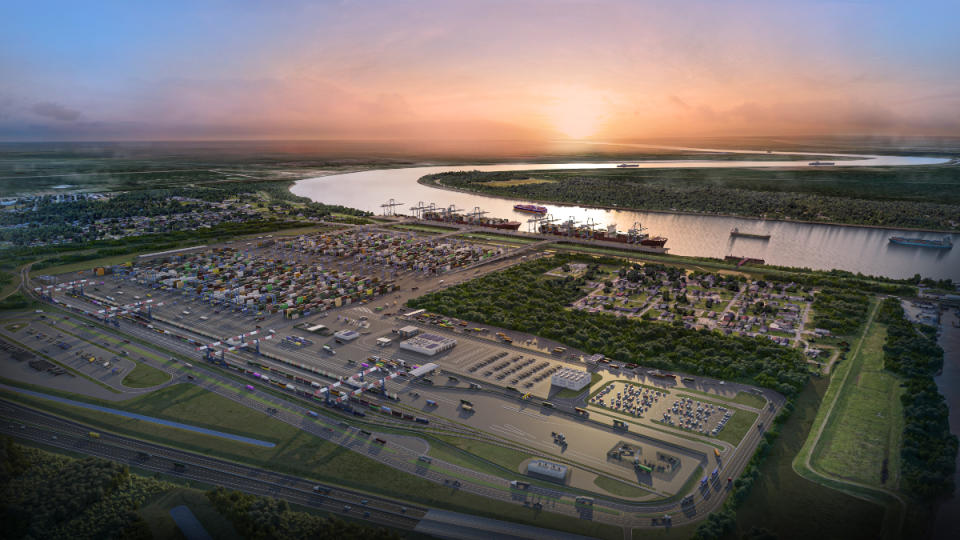Lawsuit Hits $1.8 Billion New Orleans Port Expansion

The Port of New Orleans’ planned $1.8 billion container facility is in the spotlight after a south Louisiana parish sued to block construction.
St. Bernard Parish District Attorney Perry Nicosia filed a lawsuit on Aug. 4 in 34th Judicial District Court, saying the Port of New Orleans doesn’t have the authority to build and operate the planned Louisiana International Terminal, which targets 2 million 20-foot equivalent units (TEU) in capacity, in St. Bernard Parish. The port handles up to 1 million TEUs annually today.
More from Sourcing Journal
“It was unmistakably clear that the Port of New Orleans had no general jurisdiction whatsoever in the Parish of St. Bernard,” the suit said. “All general jurisdiction in St. Bernard Parish was statutorily given to and imposed upon the Port of St. Bernard.”
The suit references legislation passed in 1992 identifying the St. Bernard Port as a political subdivision of the state of Louisiana with complete and exclusive jurisdiction to operate its international port within the parish borders.
“The legislation in 1992 made it clear that no other port has jurisdiction in St. Bernard Parish,” Nicosia said in a statement.
The Port of New Orleans first announced in 2020 that it had purchased 1,100 acres in Violet, Louisiana, a small town located along the Mississippi River south of New Orleans in St. Bernard Parish. It struck an agreement with the St. Bernard Port to build a downriver container facility to allow the port to compete with other Gulf-area ports for big ship business.
“We are aware of the filing and will review and respond in due course,” said Port of New Orleans CEO Brandy D. Christian. “However, any challenge to the Port of New Orleans’ jurisdiction to operate an international marine terminal in St. Bernard Parish is meritless, and we are confident that this will be demonstrated in the legal process.”
According to the lawsuit, the Port of New Orleans and the St. Bernard Port District have worked together under a joint cooperation and marketing agreement since 2004. In 2022, the Port of New Orleans and the state of Louisiana inked a deal with two private operators who would chip in $800 million to help build the terminal as well as finance infrastructure improvements. The lawsuit aims to terminate that cooperative agreement and declare the sale of the 1,100 acres void.
The Port of New Orleans board also recently approved $8 million in contracts to finalize design and begin construction. Earlier this year, the state of Louisiana removed $130 million of $180 million earmarked for infrastructure improvements from the state budget.
Opponents of the project argue that the facility would disrupt life for area residents and potentially cause environmental damage. But Christian said the Port of New Orleans has taken the local population in consideration throughout this process and hopes this issue can be resolved amicably among all parties. A series of meetings in March solicited public opinion on the proposed project, which the port describes as an “economic engine” creating more than 18,000 new and indirect jobs by 2050 along with more than $97 billion in industry sales.

“The design of the new terminal has incorporated extensive public feedback from the community and St. Bernard public officials,” she said. “And we will continue to work with local stakeholders every step of the way to deliver a project that brings opportunity to St. Bernard Parish and the state of Louisiana.”
The Louisiana International Terminal is positioned as a major upgrade to the export-focused port. When the project was announced in December, Tom Van Eynde, terminal investment director for the North American region for TiL, a Geneva-based terminal operator, said the expansion would “strengthen Port NOLA’s competitiveness, making it a key facility in the Gulf of Mexico capable of handling ultra-large container vessels.”
“Today, the container trade in Port NOLA mainly consists of export cargo, making it an exception among U.S. ports, which are usually import-heavy. LIT will attract new container trades, providing access for local industry to cost-competitive shipping options,” he continued, using the acronym for the terminal project. “The development of this facility cements TiL’s commitment to further strengthen American infrastructure, making Port NOLA accessible for larger vessels and increasing its throughput capacity in a sustainable way that will bring measurable benefits to the community.”

